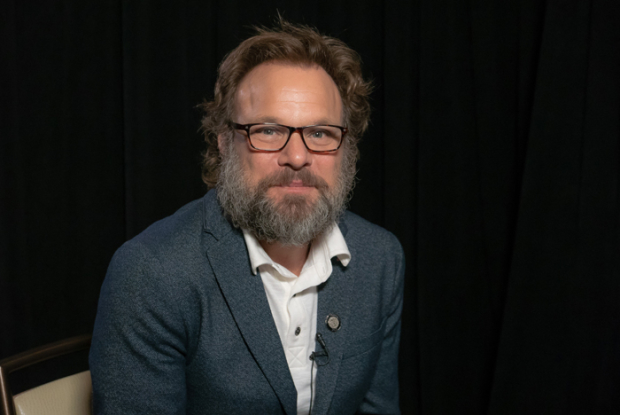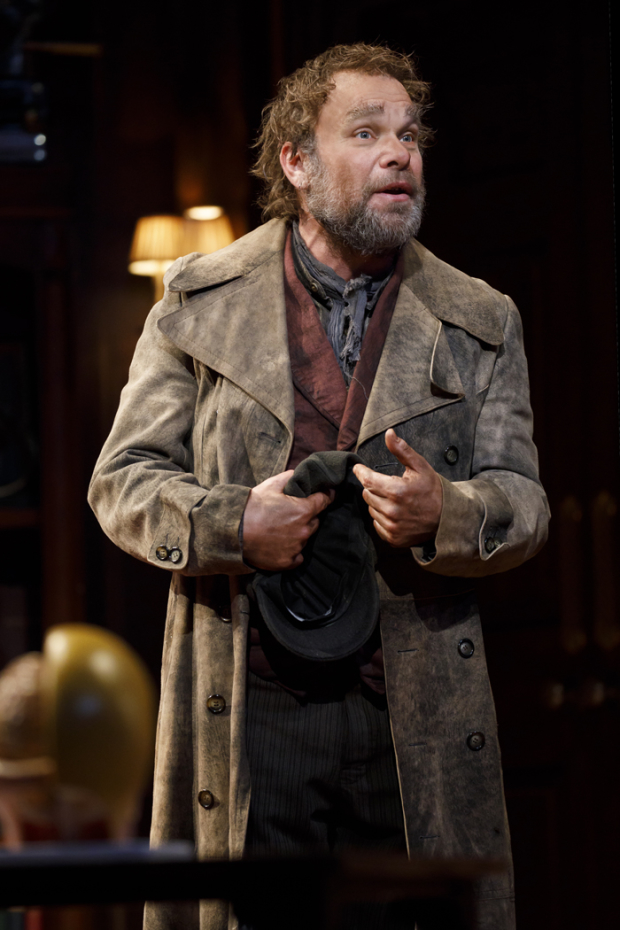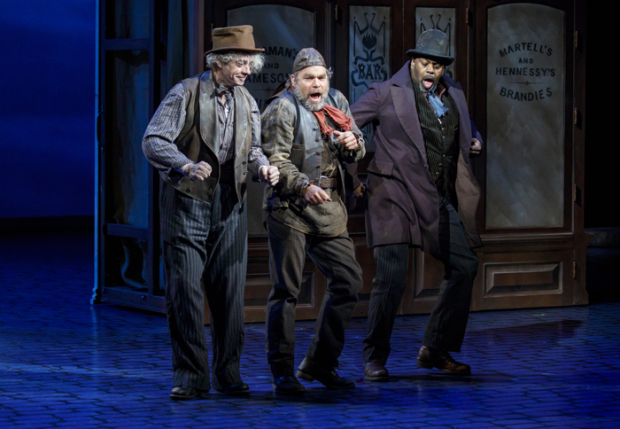Norbert Leo Butz Is Giving an Undeserving Character the Credit He Deserves
Butz could win his third Tony this Sunday for his performance as Alfred Doolittle in Bartlett Sher’s revival of ”My Fair Lady”.

(© Seth Walters)
Tony nominations don't pay the bills. Norbert Leo Butz learned that lesson 16 years ago from his brief turn in Thou Shalt Not, a jazz musical composed by Harry Connick Jr., directed by Susan Stroman, and based on the Émile Zola novel Thérèse Raquin. "Nobody saw it and the people that did didn't like it. That was my first Tony nomination."
Wins don't keep the lights on either, though Norbert Leo Butz was delighted and honored to earn his two Tonys first in 2005 for his performance as Freddy Benson Dirty Rotten Scoundrels, and then in 2011 for his role as Agent Carl Hanratty in Catch Me If You Can.
"A lot of people might take a job because it's an artistic dream," said Butz from his current Broadway dressing room at Lincoln Center Theater. "More often than not, I take jobs because I have to earn a living." As a father of three girls (two with college tuitions), both accolades and creative fulfillment take a back seat to a paycheck. And yet, all three (somewhat unexpectedly) fused in Bartlett Sher's Lincoln Center Theater revival of My Fair Lady, in which Butz — now a four-time Tony nominee — has a grand total of approximately 25 minutes onstage as Bernard Shaw's ne'er-do-well Alfred P. Doolittle.
"I'm usually somebody that doesn't like to sit in my dressing room all night. My metabolism always wants to be doing something," said Butz. He pointed to his guitar and a stack of books piled on his dressing room table as some of the activities that bide the hour and 45 minutes offstage between appearances. "I almost didn't do it — but Bart called, you know?"

(© Joan Marcus)
He described Sher as one of his "bucket list" directors, which largely influenced his decision. But it was the musical's script that ultimately won him over. "I was really impressed with all the ideas in it. It's rare in a musical to have such rich source material. And the lines that I have, more than any other character, are lifted directly from Pygmalion, so it's pure Shaw. And then the number ["Get Me to the Church on Time"] is difficult because it's so wild and physical." Past his pile of books is an array of "potions" (as he lovingly calls them) for his various injuries, including a hamstring tear he sustained during an early preview and with which he has been jumping on tables ever since. "What I thought was going to be a walk in the park has turned out to be kind of a really hard job."
You could say the job is as unassuming as Doolittle himself, who, at face value, seems to be your average lazy drunkard, on call for comic relief. And yet, Shaw — a staunch socialist living and writing in late 19th- and early 20th-century London — tasks Doolittle with calling out the hypocrisy of so-called "middle class morality" and the unsystematic distinction between the "deserving" and "undeserving poor."
"What is middle class morality?" Doolittle asks the distinguished Henry Higgins and Col. Pickering, cheekily bargaining for some Christian charity. "Just an excuse for never giving me anything. Therefore, I ask you, as two gentlemen, not to play that game on me. I'm playing straight with you. I ain't pretending to be deserving. I'm undeserving, and I mean to go on being undeserving."
"Shaw gives him this wit and charm and self-knowledge about exactly who he is," explains Butz. "It's in that way that Shaw likes to mess with ideas of class and socioeconomics. The theater is a political tool for somebody like Shaw" — and appropriately so, as someone who was writing during a seismic political shift. "World War I is about to happen in 1914, so there's this slow march toward this war the likes of which the world had never seen before. Women like Eliza Doolittle are popping up and saying, 'I'm going to get myself educated.' This Victorian class structure is starting to crumble. I don't know if Doolittle is able to intellectualize that much, but I do know that he would feel — as everyone would feel in London in 1911 and 1912 — a shift."
It's a shift we see reflections of — perhaps not coincidentally — in the American climate in which My Fair Lady made its 1956 Broadway debut. "I was coming in thinking, oh, I'm going to be doing all this Shaw work," said Butz, who did indeed read plenty of Shaw to help him marinate in the mind of Alfred Doolittle. Sher, however, simultaneously pointed him toward the counterculture literature that paved the way for America's women's liberation and civil rights movements. "You had people like Neal Cassady and J.D. Salinger and Ken Kesey — these guys who were kind of Doolittles in the '50s and '60s. They're living their lives almost as a political statement. They were saying, 'Who says I have to get married and have 2.1 kids and live in the suburbs? I want to do experimental drugs and write crazy poetry and live in a van. I'm not going to be a part of these larger cultural trends. I'm my own man.'
"They're not looking to be liked," Butz clarified, verifying that Alfred Doolittle and his Beat poet counterparts are neither role models nor beacons of transcendent wisdom. And yet, "he is definitely breaking something," said Butz about his brash character. Perhaps that break, or, rather, its promise of imminent change, is why My Fair Lady's 2018 audiences are newly receptive to a 62-year-old musical based on a 100-year-old play (Sher's revival received a total of 10 Tony nominations, matching its original Broadway production for the most nominations the musical has ever received).
"There's some weird sh*t going on," Butz said. The weirdest part about the unfolding upheaval, though, is its eerie familiarity, with fights for gender equality echoing generations past and arbitrary distinctions between the deserving and undeserving muddling our welfare system.
"Who makes the decision who's deserving and undeserving?" asked Butz rhetorically. He posed the question in reference to the life-or-death policies on which many populations have hinged for centuries. But he unknowingly answered it 30 minutes earlier in our less dire conversation about the awards season that wraps up this Sunday at Radio City Music Hall: "There's no rhyme or reason for any of it."

(© Joan Marcus)








